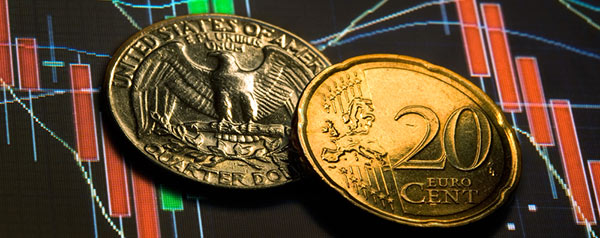The US Dollar to Euro (USD/EUR) exchange rate climbed in the first half of Friday’s European session ahead of a Eurogroup meeting, despite a rise in Eurozone Composite, Manufacturing and Services Purchasing Managers Indexes (PMI).
The composite measure recorded 53.5 in February from the previous 52.6 and the forecast 53.0.
The US Dollar to Euro (USD/EUR) exchange rate declined during Thursday’s European trading as investors feared that the Greece negotiations may have reached another hurdle–this time in Eurozone powerhouse, Germany.
Greece submitted a request to extend its current bailout programme for another six months as the deadline is fast approaching (February 28th); however, Germany said it would oppose the proposal.
Kate Connolly reported: ‘Schauble continues to insist that Greece sticks to the bailout conditions agreed with previous governments under which financial support will be given only in exchange for substantial structural reforms.’
‘The finance ministry’s position risks deepening splits within Europe over how to deal with Greece as an end of February deadline nears at which the previous bailout agreement with its creditors and the European Central Bank runs out, leaving Greece facing bankruptcy.’
The US Dollar to Euro (USD/EUR) exchange rate remained in a narrow range on Thursday after the Federal Reserve released dovish meeting minutes suggesting it was in no rush to hike interest rates.
The Fed was forecast to be the first major central bank among the group of seven (G7) developed nations to hike rates since the onset of the global financial crisis. However, at one point last year the Bank of England (BoE) was in the same position; strong UK data and a hawkish central bank was enough to see the British Pound (GBP) rally and investors place bets for increased borrowing costs as early as November 2014.
However, the data slowed and the BoE turned dovish causing many economists to price in rate hikes as far away as 2016. The US Federal Reserve appears to be going down the same road—US data is weakening and the central bank is becoming less hawkish—an event many industry experts hadn’t expected.
The tumbling price of oil has contributed toward falling inflation the world over and led central banks to cut rates—some suggested it was only a matter of time before the Fed also took a hit.
Analyst Junichi Ishikawa commented: ‘Expectations for a June rate increase by the Fed are retreating. The strong Dollar story may be coming to the point where it has to be reevaulated.’
US Dollar (USD) Exchange Rate Drops on Dovish Fed Minutes
The US Dollar fell by around 0.2% on the release of the Fed minutes.
The Fed statement read: ‘Many participants indicated that their assessment of the balance of risks associated with the timing of the beginning of policy normalisation had inclined them toward keeping the federal funds rate at its effective lower bound for a longer time.’
Since the onset of the global financial crisis the lending rate has been in the range of 0.00-0.25%.
Currency analyst Alfonso Esparza stated: ‘Their concern about a strong Dollar came through, and that puts summer for a rate hike as a very unlikely timetable—we’re probably looking at the fall. They don’t want to raise rates too soon and have the strong Dollar and higher rates damp the growth of the US economy.’
US Dollar to Euro (USD/EUR) Exchange Rate Forecast
The US Dollar to Euro (USD/EUR) exchange rate is preparing for an interesting day on Thursday when the European Central Bank (ECB) releases its meeting minutes for the first time in history. Many central banks such as the BoE and ECB have been attempting to create greater transparency into their inner workings in an attempt to encourage more confidence.
The ECB minutes will detail the January 22nd meeting which saw the central bank announce it was planning to undertake a period of quantitative easing (QE).
By way of domestic data, Thursday will see the publication of US Initial Jobless Claims, Continuing Claims, Leading Indicators and the Philadelphia Federal Reserve Manufacturing Index. Eurozone Consumer Confidence will also emerge.
However, any developments in the situation between Greece and its creditors is also likely to cause Euro to US Dollar (EUR/USD) movement.
The US Dollar to Euro (USD/EUR) exchange rate is trading at 0.8778. The Euro to US Dollar (EUR/USD) exchange rate is trending in the region of 1.1397.



